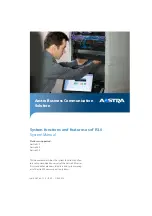
Features
1-22
Introducing the IntelliVue Information Center System
external software device of alarms is not confirmed and delivery to the end device is not
guaranteed. Clinicians using Alert Data Export must remain within monitoring distance
of the primary alarm notification device.
The primary alarm notification device is either the bedside monitor (if present) or the
Information Center.
All alarms (red, yellow, and INOPs) for all beds being monitored by the Information Center
are automatically exported in textual format to the receiving device. Alarms are sent in the
order in which they occur. So, if a yellow alarm occurred for one bed immediately followed
by a red alarm for another bed the yellow alarm is sent first followed by the red. The format
of the alarm text sent is bed label:: alarm level (high, medium, low priority) and alarm text
(for example Bed4::*** Asystole). If the Information Center is configured to have alarm
reminders, the format of the alarm reminders sent is, bed label:reminder label:alarm level
(high, medium, low priority) and alarm text, (for example, Bed4:REM:*** Asystole).
If connection between the Information Center and Alert Data Export receiving device is lost
for any reason no alarms are sent and the message “Alarm paging not available” displays in
the Information Center system message area.
Data Reliability
The M3154 Database Server utilizes RAID (Redundant Array of Independent Disks)
technology to assure fault tolerant data collection and storage in the event of disk failure. Data
are written to multiple disks simultaneously to provide data storage redundancy. If the Server
or Network fails for any reason, Information Centers revert to local database operation so that
patient monitoring data collection are maintained. The M3169 Database Server does not use
RAID.
Remote Access
Error Logs
, showing all events that occur in each device on the Network when it starts and as
it operates and giving device operational status, can be accessed during patient monitoring via
a modem in the Server. This permits efficient troubleshooting and problem identification
without disruption to patient care.
Information
Center Web
Access
The Information Center Web provides remote, read-only access to physiologic patient data
that is resident on an M3154 Database Server. Patient Data Review applications on the
M3154 Database Server can be accessed via the hospital’s HIS intranet using standard web
browsers, such as Internet Explorer and Netscape. In a Large network system, up to 100
simultaneous users can view stored waves, alarms, events, ST segments, trends, and viewable
recording strip data for each patient in the M3154 Database Server. Data are accessed by a
configurable log-on procedure using the
hostname
of the Database Server or the
IP Address
of the Web LAN card in the Server as the URL to access the
Information Center WEB
TM
Login
window shown in
Web access is not available on the M3169 Small Database Server.
Note
The URL can also be the
Host
name of the Server if the hospital LAN’s DNS (Dynamic Name
Server) is properly configured. However, if there are multiple Servers on the Network, each
Server’s
Host
name must be unique.
Summary of Contents for IntelliVue Series
Page 152: ...IntelliVue Information Center Application Software 3 22 Software Description ...
Page 442: ...Troubleshooting 7 156 Maintenance Troubleshooting and Repair ...
Page 488: ...Procedure B 12 Web Installation on the Database Server ...
Page 492: ...Procedure C 4 External Modem Installation ...
Page 500: ...Using RAS D 8 Dial In Procedure for Remote Access to Information Center Systems ...















































